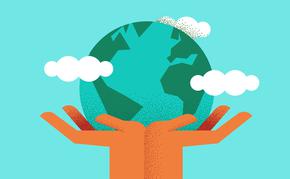The views expressed in our content reflect individual perspectives and do not represent the authoritative views of the Baha'i Faith.
When we address human rights and social justice issues, it helps to pause, rewind the conversation, and look for those spiritual attributes needed to sustain a lasting solution.
With increasing awareness that it’s no longer OK to say “people just want to be with their kind,” individuals and local communities are addressing the cancer of racism, whose tentacles ensnare individual psychology and institutional structures. Though the necessary change is monumental, Baha’u’llah – the prophet and founder of the Baha’i Faith – provided guidance for how to achieve it. Indeed, a basic tenet of his teachings emphasizes the need for unity: “The well-being of mankind, its peace and security, are unattainable unless and until its unity is firmly established.”
RELATED: An Undeniable Truth: We Are One
Unity through Social Justice
The Baha’i teachings also bring a clear understanding that before we can feel, and actually be, united as a people, we must work to establish social and economic justice. In his book The Hidden Words, Baha’u’llah wrote:
The best beloved of all things in My sight is Justice; turn not away therefrom if thou desirest Me, and neglect it not that I may confide in thee. By its aid thou shalt see with thine own eyes and not through the eyes of others, and shalt know of thine own knowledge and not through the knowledge of thy neighbor. Ponder this in thy heart; how it behooveth thee to be. Verily justice is My gift to thee and the sign of My loving-kindness. Set it then before thine eyes.
So how can we include justice and other spiritual attributes in our conversations, our discourse, and in our work? How can we and our co-workers seek unity of thought in finding and acting on solutions?
To find solutions, we can turn once more to Baha’u’llah, who shared the exquisite problem-solving tool of Baha’i consultation. The practice of this kind of consultation requires a thoughtful, prayerful approach, the quelling of ego, the commitment to finding truth in the situation, the search for underlying spiritual principles, the release of any personal ownership of ideas, and the agreement that the final determinant of a solution is how it aligns with the primary spiritual teachings of all the world’s great Faiths. Baha’u’llah wrote:
Man’s merit lieth in service and virtue and not in the pageantry of wealth and riches. Take heed that your words be purged from idle fancies and worldly desires and your deeds be cleansed from craftiness and suspicion.
When groups use the toolkit of consultation, they often find that it promotes conciliation, harmony, and unified action. First, though, it helps to seek to understand how our society’s injustices originally developed.
Pondering How to Enact Justice by First Understanding History
If we ponder in our hearts how to enact justice, we begin to see how some inequities began. For example, we know from the history of the United States that when formerly enslaved people moved north after the Civil War, they were drawn to cities and the jobs available there. But in a bitter irony – while centuries of Black people’s free labor enabled numerous white families to amass incredible wealth, live in palatial mansions, and pass on this wealth to generations of heirs – their possibilities of attaining generational wealth were stifled when ownership of land and homes fell victim to a racist system.
Often when people are presented with such facts, they’re fair-minded enough to examine their own assumptions and prejudices and understand the historical forces that led to some of the grave, long-term injustices that continue to plague our society today.
RELATED: How Being a Baha’i Deepened My Definition of Interfaith Relations
One Interfaith Community’s Response: A Mighty Stream
Through years of interaction, consultation, and friendship, the interfaith community in Cincinnati, Ohio has created a new program to address racial injustices called A Mighty Stream (AMS). Taken from the Bible’s well-known passage in Amos 5:24 – “But let judgment run down like waters, and righteousness as a mighty stream” – AMS has united to seek social justice.
Many local faith communities already commit to social action – like signing petitions and lobbying for legislation – and were eager to involve more religious groups in similar efforts. But others involved in AMS, like the Baha’is, who see necessary change needing to arise from a spiritual place, have encouraged equal time to sharing the scriptural guidance of our faith traditions about our calling to contribute to the betterment of society. This is a dimension that people of faith bring to social action work that’s too often lacking in other civic-minded organizations. Baha’is, for example, try to follow Baha’u’llah’s guidance to: “Be anxiously concerned with the needs of the age ye live in, and center your deliberations on its exigencies and requirements.”
The AMS project began during the pandemic, when congregations weren’t gathering in person, so the group’s primary focus has been educational, with one interfaith committee working on presentations from two perspectives: spiritual guidance from various religions on racial justice; and facts and information about racial equities and sacred activism.
Our ultimate goal at AMS involves opening our doors and encouraging congregations to reach out to religious communities different from our own to mutually share our perspectives and continue to establish bonds of true friendship in the quest for justice.

















Comments
Sign in or create an account
Continue with Facebookor